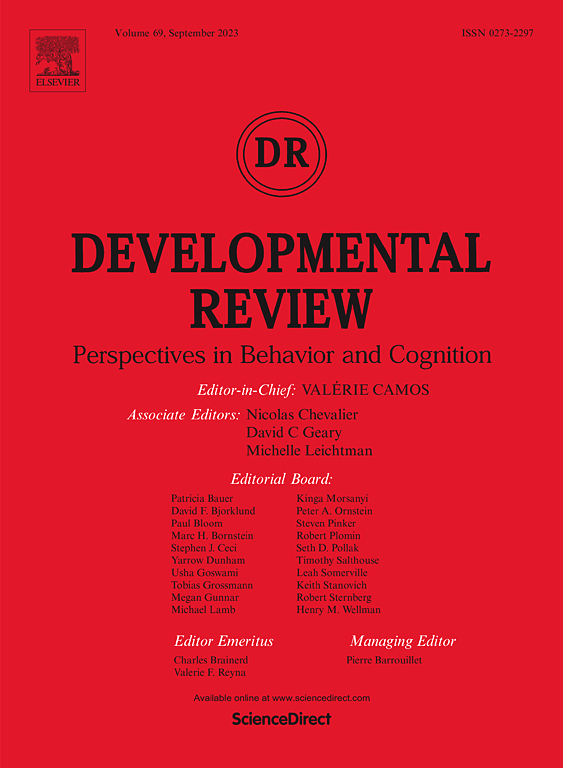How age and culture influence cognition: A lifespan developmental perspective
IF 5.6
1区 心理学
Q1 PSYCHOLOGY, DEVELOPMENTAL
引用次数: 0
Abstract
It has long been assumed that cognitive aging is a universal phenomenon. However, increasing evidence substantiates the importance of individual differences in cognitive aging. How do experiential factors related to culture shape developmental trajectories of cognition? We propose a new model examining how age and culture influence cognitive processes, building on past models and expanding upon them to incorporate a lifespan developmental perspective. The current model posits that how age and culture interact to influence cognition depends on (a) the extent to which the cognitive task relies on top-down or bottom-up processes, and (b) for more top-down processes, the level of cognitive resources required to perform the task. To assess the validity of the model, we review literature not only from adulthood but also childhood, making this the first model to adopt a lifespan perspective in the study of culture and cognition. The current work advances understanding of cognitive aging by delineating the combined effects of biological aging processes, assumed to apply across cultures, and culture-dependent experiential aging processes, which reflect unique cultural experiences throughout one’s lifespan. This approach enables understanding of comprehensive potential mechanisms that underlie the influence of culture on cognitive development across life stages.
年龄和文化如何影响认知:生命发展的视角
长期以来,人们一直认为认知衰老是一种普遍现象。然而,越来越多的证据证实了个体差异在认知衰老中的重要性。与文化相关的经验因素如何塑造认知的发展轨迹?我们提出了一个新的模型来研究年龄和文化如何影响认知过程,在过去的模型的基础上进行扩展,以纳入生命发展的视角。目前的模型假设,年龄和文化如何相互作用影响认知取决于(a)认知任务依赖于自上而下或自下而上过程的程度,以及(b)对于更自上而下的过程,执行任务所需的认知资源水平。为了评估该模型的有效性,我们不仅回顾了成年时期的文献,还回顾了童年时期的文献,这是第一个在文化和认知研究中采用生命周期视角的模型。目前的工作通过描述生物衰老过程(假设适用于跨文化)和文化依赖的经验衰老过程(反映整个人一生中独特的文化经历)的综合影响,推进了对认知衰老的理解。这种方法使我们能够理解文化对人生各阶段认知发展影响的综合潜在机制。
本文章由计算机程序翻译,如有差异,请以英文原文为准。
求助全文
约1分钟内获得全文
求助全文
来源期刊

Developmental Review
PSYCHOLOGY, DEVELOPMENTAL-
CiteScore
11.00
自引率
3.00%
发文量
27
审稿时长
51 days
期刊介绍:
Presenting research that bears on important conceptual issues in developmental psychology, Developmental Review: Perspectives in Behavior and Cognition provides child and developmental, child clinical, and educational psychologists with authoritative articles that reflect current thinking and cover significant scientific developments. The journal emphasizes human developmental processes and gives particular attention to issues relevant to child developmental psychology. The research concerns issues with important implications for the fields of pediatrics, psychiatry, and education, and increases the understanding of socialization processes.
 求助内容:
求助内容: 应助结果提醒方式:
应助结果提醒方式:


